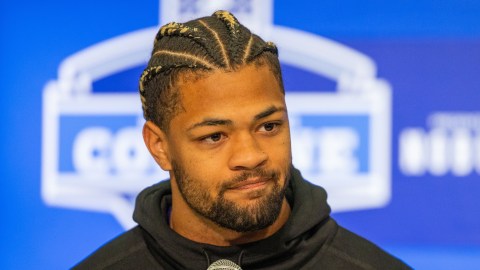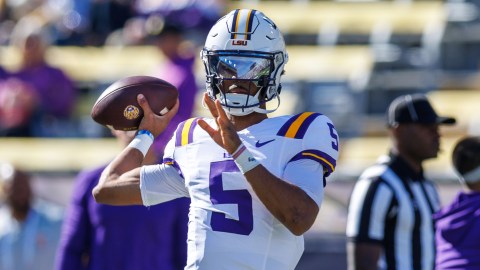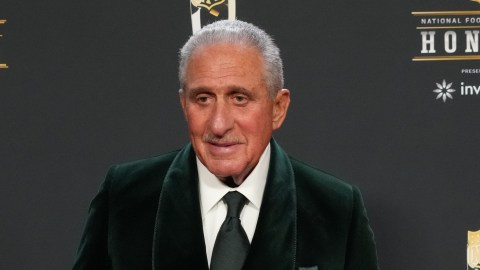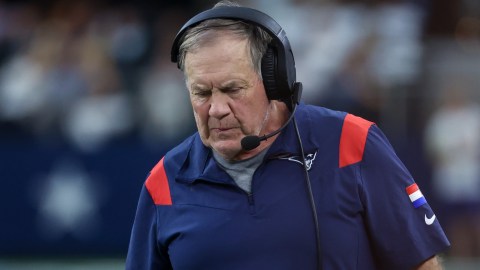Kurt Warner was a great passer, a solid family man and a faithful follower of his religion, but he's not a Hall of Famer.
His announcement on Friday that he would be calling it quits sparked plenty of pieces of adulation from the sports community, and rightfully so. Watching Warner for parts of the last dozen years or so has been exciting to say the least. He quarterbacked the high-flying Rams of the late '90s and early 2000s before taking the helm of an explosive Cardinals offense in the latter part of this decade.
But providing excitement and earning enshrinement are two separate things altogether.
A Hall of Famer in any sport is a player who demonstrated sustained excellence. There's not one word in that little two-word phrase that takes precedence over the other. You must be great, and you must be consistently great for a long period of time.
And make no mistake: Warner was great. He was great from 1999-2001, when he completed 67.2 percent of his 1,392 passes for an average of 4,204 yards, 33 touchdowns and 18 interceptions per season. He was great again from 2007-09, a three-year span in which he completed 65.4 percent of his 1,562 passes for an average of 3,918 yards, 28 touchdowns and 15 picks.
But in between, he wasn't great. He bordered on the line between "pretty good" and "almost bad." Typically, Hall of Fame quarterbacks don't lose their starting jobs to Marc Bulger, but Warner did. Normally, Hall of Fame quarterbacks don't get sent to New York City to usher in a rookie, only to get benched midway through the season. Again, Warner did. Additionally, Hall of Fame quarterbacks don't get shuffled in and out of the starting offense with Josh McKown, but again, Warner did. And lastly, Hall of Fame quarterbacks don't get replaced in the middle of a season by Matt Leinart. Warner did.
That history alone isn't enough to keep Warner out of the Hall; quite the contrary, in fact. To persevere through so many ups and downs creates an admirable record for Warner, and it shows qualities that any Hall of Fame athlete could admire.
But the story doesn't end there. It's no coincidence that Warner's best statistical seasons coincided with the years in which he had the best receivers lining up around him. From 1999-2001, there was Marshall Faulk, Isaac Bruce and Torry Holt in the prime of their careers. In Arizona, there was an emerging Larry Fitzgerald and Anquan Boldin. In 2004, Warner couldn't get it done with Jeremy Shockey, Amani Toomer, Ike Hilliard and Tiki Barber as his best options.
There's also the fact that Warner's best years came in a dome in St. Louis and an indoor haven in Arizona. Playing outdoors in Giants Stadium did not suit him very well.
That argument alone is not enough to keep Warner from the Hall, but there's more. There's the whole problem of "sustaining" his level of play, considering he's played in only 123 games in 11 seasons (which excludes his rookie season). That's an average of just 11 games per season. Though the reasons have been varied (injuries, benchings, etc.), that's simply not Hall of Fame material. Can he really be among the all-time greats if he played in less than 70 percent of his teams' games?
Part of the reason there is such a swell of support for Warner's induction is the fact that in the past three seasons, he's played 14, 16 and 15 games, respectively. He finished his career on a strong note, putting an exclamation point on what looks on the surface to be a storied career. However, when examined a little closer, that story clearly has some less-than-memorable chapters.
That's not to ignore the argument for Warner. He's won the Super Bowl, played in two others, earned league MVP honors twice and was deadly accurate when he was on the field. He owns a 9-4 career postseason record and his most recent playoff victory was one of the most enjoyable games that a football fan could ask for.
But Warner, while impressive over the last three seasons, doesn't even stand head and shoulders above his peers. Peyton Manning has thrown for 158 more touchdowns and nearly 18,000 more yards. Tom Brady has thrown for 17 more touchdowns and just 2,000 fewer yards in a much shorter span of time (plus, despite missing 15 games in 2008, Brady's still averaged 14 games per season in his nine years as a starter). Drew Brees has six fewer touchdowns than Warner, roughly 2,000 fewer yards and 18 fewer picks.
Even Phillip Rivers has compared well to Warner over the past three seasons, registering nearly the same mark as Warner in completion percentage (Warner, 65.4; Rivers, 63.6), yards (Warner, 11,753; Rivers 11,415), touchdowns (Warner and Rivers both have 83) and interceptions (Warner, 45, Rivers, 35).
Even with three solid years, it's safe to say Rivers has quite a long way to go before he earns a trip to Canton. Warner is in the same boat.
Warner did get the approval of a number of Hall of Fame quarterbacks, including Troy Aikman, Fran Tarkenton and Len Dawson.
"I believe a player is a Hall of Fame player if you can't tell the story of the history of the game without mentioning that player," Aikman told the Sporting News. "In my opinion, no account of the NFL can be accurately given without discussing Kurt Warner's impact on the game."
While it's nice that Aikman, now a color commentator on Fox, would welcome Warner with open arms, he is wrong. By that standard, any player to have an impact on a Super Bowl would have to be a Hall of Fame player. Trent Dilfer would be in there, as would Brad Johnson. Even David Tyree, he of 54 receptions and four touchdowns, would be immortalized in the form of a bronze bust.
For me, what it really comes down to is this: It's been fun watching him huck the football, but I won't be telling my grandchildren that I once watched Kurt Warner play football. That spot is reserved for Dan Marino, Steve Young, John Elway, Troy Aikman, Tom Brady and Peyton Manning (Jim Kelly, a Hall of Famer, isn't on my list either). Warner is without question a big part of NFL history, but he's not one of the best. He was fun to watch, he was great at times, but he falls just short of enshrinement.



